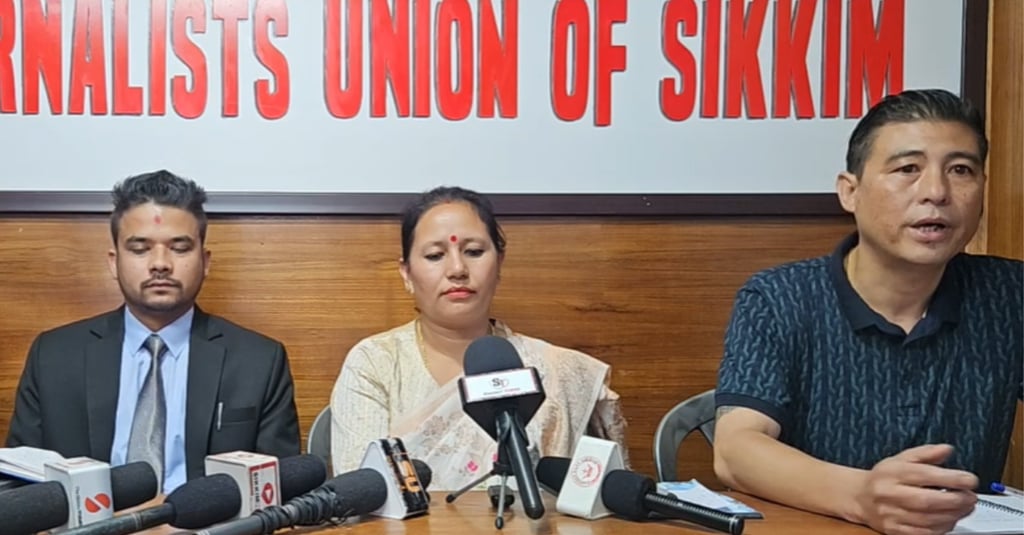SCPCR urges responsible social media use and proper reporting to protect children
The Commission also highlighted that the law provides penalties for spreading misinformation or violating a child’s right to privacy.
LOCAL


The Sikkim State Commission for Protection of Child Rights (SCPCR) has appealed to citizens, digital creators, and civil society groups to act with responsibility while handling matters related to children. At a press conference in Gangtok, Chairperson (Lady) Deepa Khatri and Member Anish Sharma stressed that children’s safety and dignity must always come first and warned against the rising trend of “social media trials.”
Addressing the media, Ms. Khatri said the Commission was receiving an increasing number of complaints and queries regarding child-related cases. While many of these were genuine, some were based on incomplete or misleading information. She cautioned that half-truths and rumours, especially when circulated widely on social media, could harm children and disturb official investigations. “Please do not make social media a platform for trial and judgment. A child’s safety is the priority, and their privacy must be respected,” she said.
Mr. Sharma explained the role of the Commission, noting that the SCPCR is a statutory body empowered to inquire into complaints, visit institutions, and recommend action to the authorities. He said the Commission works closely with the police, District Child Protection Units, Child Welfare Committees, and Anti-Human Trafficking Units to ensure proper action in every case. “We are here to protect children. But for the system to work smoothly, people must use the proper channels to report their concerns,” he said.
The officials pointed out that posts on social media often created unnecessary panic. In some cases, children’s identities were revealed, either directly or indirectly, which is against the law. Ms. Khatri reminded the public that sharing a child’s name, photograph, or address in such cases is strictly prohibited. “Do not expose a child to public fear or shame. Once a child’s identity is revealed, the damage cannot be undone,” she said.
Both officials underlined that there are established mechanisms in place to deal with child-related concerns. Citizens can approach the Special Juvenile Police Units, the Child Welfare Committees, or the District Child Protection Units. In cases of trafficking, the Anti-Human Trafficking Units and the CID branch are involved. Labour-related violations are handled by the Labour Department. “Every district has a system. Please use it. Do not rely on rumours and viral posts,” Mr. Sharma urged.
The Commission also highlighted that the law provides penalties for spreading misinformation or violating a child’s right to privacy. Digital creators and influencers were reminded that they, too, could face punishment if they spread false content or identify a child in their videos or posts. Ms. Khatri said, “We are not against creators or media. But we want them to act responsibly. Verify before you post. Protect the child’s identity. Do not sensationalize.”
During the press conference, the SCPCR team also noted that the number of reported child-related cases in the state has risen in recent years. They said part of the rise reflected genuine challenges such as trafficking, unsafe migration, and child labour, but another part reflected better awareness among citizens. The Commission welcomed this awareness but called for cooperation with authorities rather than creating parallel judgments on social platforms.
The officials said that the Commission is planning training programmes for digital creators, schools, and child protection committees to spread awareness about ethical reporting and safe complaint processes. They also promised to publish simple guidelines in plain language so that the public knows exactly whom to contact and what steps to follow in an emergency.
Khatri summed up the Commission’s appeal in three clear points: “Verify first. Protect the child. Use the proper forums.” Mr. Sharma added that the cooperation of society, government agencies, and digital platforms was essential to keep children safe. “We will act on every genuine complaint. But we request everyone not to create panic or spread rumours. Let us all work together for the best interest of children,” he said.
